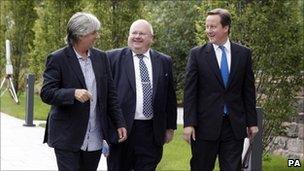Liverpool withdraws from government 'big society' pilot
- Published
Joe Anderson: "I'm not prepared to try and pretend the Big Society is going to deliver"
The leader of Liverpool City Council has written to the prime minister withdrawing its involvement from his "big society" plans.
The city was one of four pilot areas for the scheme, aimed at giving community groups and volunteers more control over their local services.
But council leader Joe Anderson said government cuts had threatened the future of many local volunteer groups.
Immigration minister Damian Green said the decision was a "political gesture".
When he announced the "big society" in Liverpool last July, Mr Cameron said community groups should be able to run post offices, libraries, transport services and shape housing projects.
The concept would be a "big advance for people power", he said.
While reducing the budget deficit was his "duty", the prime minister said giving individuals and communities more control over their destinies was what excited him and was something that had underpinned his philosophy since he became Conservative leader in 2005.
Merseyside television producer Phil Redmond has already attacked the "big society" idea, saying it has been undermined by public spending cuts.
The Brookside and Hollyoaks creator had originally been a fan of the concept, taking charge of a project involving volunteering and cultural activities in Liverpool.
He said: "I do remain a strong supporter of the principle behind big society, because it wasn't too long ago that the media was full of stories about Big Brother, too much red tape, surveillance society, we need to get engaged with society and so on.
"It just came at the wrong moment."
He said there was a need to make sure there was a separation between the big society plans and the cuts.
'Failed to deliver'
In his letter to the prime minister, Mr Anderson said: "You will recall that you announced Liverpool as one of four 'big society' vanguard areas last summer with Phil Redmond leading the initiative.
"Later in the year, Liverpool City Council was asked to assist in this initiative around some key projects, including running a 'parallel vanguard programme'.
"We took up this challenge wholeheartedly and have invested significant resources to deliver this substantial programme of activity."
However, he said the government promised to work with the Labour-run council to "remove some of the problems and blockages" that were preventing them from making the programme work.

David Cameron announced his plans during a visit to Liverpool in July
He said the government had failed to deliver any of the changes the council asked for.
Mr Anderson, who is leader of the Labour Party in Liverpool, said: "Liverpool has been doing the 'big society' for many years. We call it 'working with our communities' and it is something we are very much committed to."
But he said the loss of more than £100m of Area Based Grants to Liverpool has put many organisations at risk.
"How can the city council support the big society and its aim to help communities do more for themselves when we will have to cut the lifeline to hundreds of these vital and worthwhile groups?," he said.
"I have therefore come to the conclusion that Liverpool City Council can no longer support the big society initiative, as a direct consequence of your funding decisions."
Sean Brennan, leader of Sutton Council in south London - one of the other pilot areas - said the authority would continue to take part in the scheme.
Mr Cameron's official spokesman said Mr Anderson's letter had been received and Downing Street was considering its response.
"We are looking into what the particular issues are and whether there were particular barriers and problems in that particular project, and seeing if there is anything we can do to unlock that," said the spokesman.
'Real freedoms'
"What we are trying to do here is something new and something slightly different to what has been done in the past.
"The purpose of putting in place these first projects was to see what would work and that is what we are doing."
Damian Green told the BBC's Question Time: "This is a council that needs to look at how it spends its own money.
"Its recently retired chief executive was earning twice as much as the prime minister."
He said there was "massive waste" in local government, and that people in Liverpool "will want to see whether all the money is being spent as efficiently as it might be and that front-line services therefore could perhaps be protected better".
'Community led'
He added: "It's a problem for every local council. They've got to decide whether they keep going how they're used to or whether they actually try and protect front-line services."
A spokesperson from the Department for Communities and Local Government said: "The big society vanguards are led by local communities and people - not central government.
"The initial four vanguard areas have been invaluable training grounds and have demonstrated where barriers, both cultural and practical, should be removed through deregulation, direct support or measures in the Localism Bill.
"Every bit of the public sector needs to do its bit to help reduce the massive budget deficit, and help ensure jobs and economic stability.
"But the new government is giving councils real freedoms to promote local economic growth and to focus resources on frontline services and local priorities."
- Published27 January 2011
- Published19 July 2010
- Published19 July 2010
- Published19 July 2010